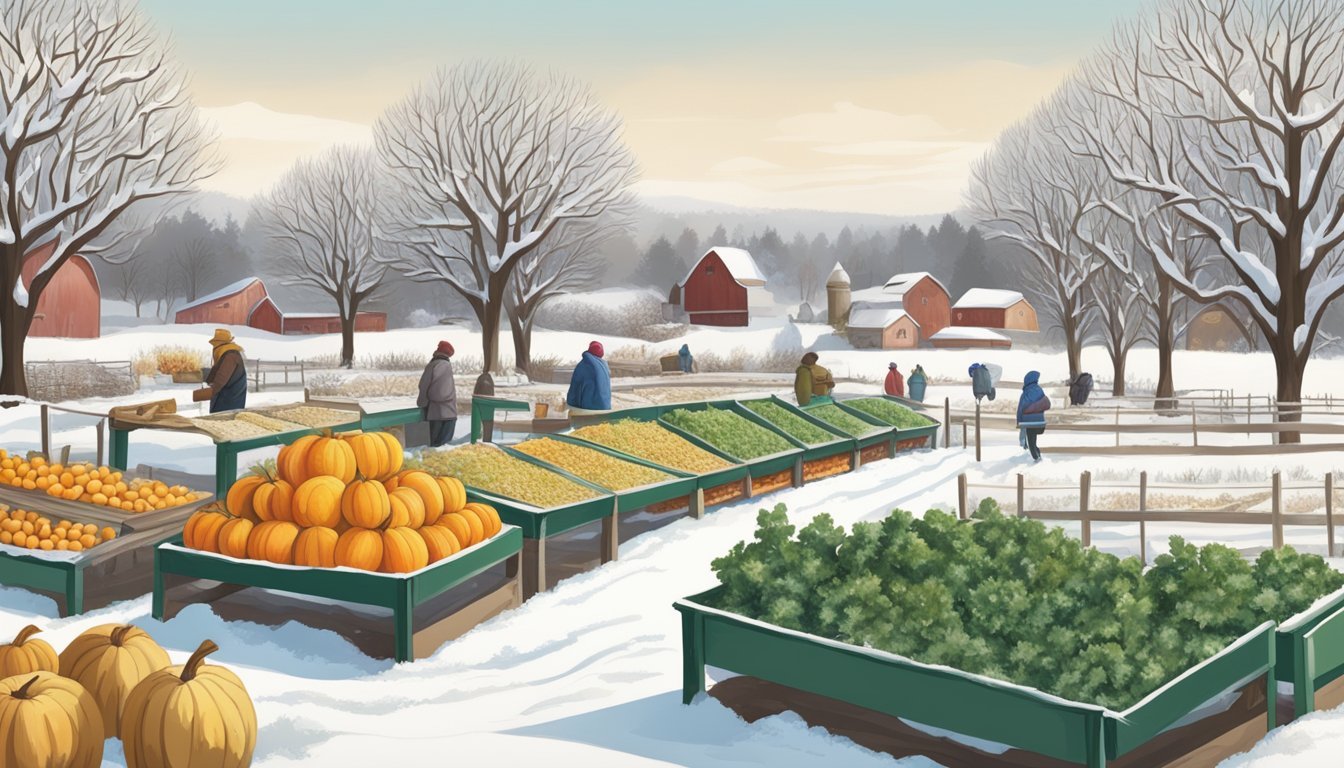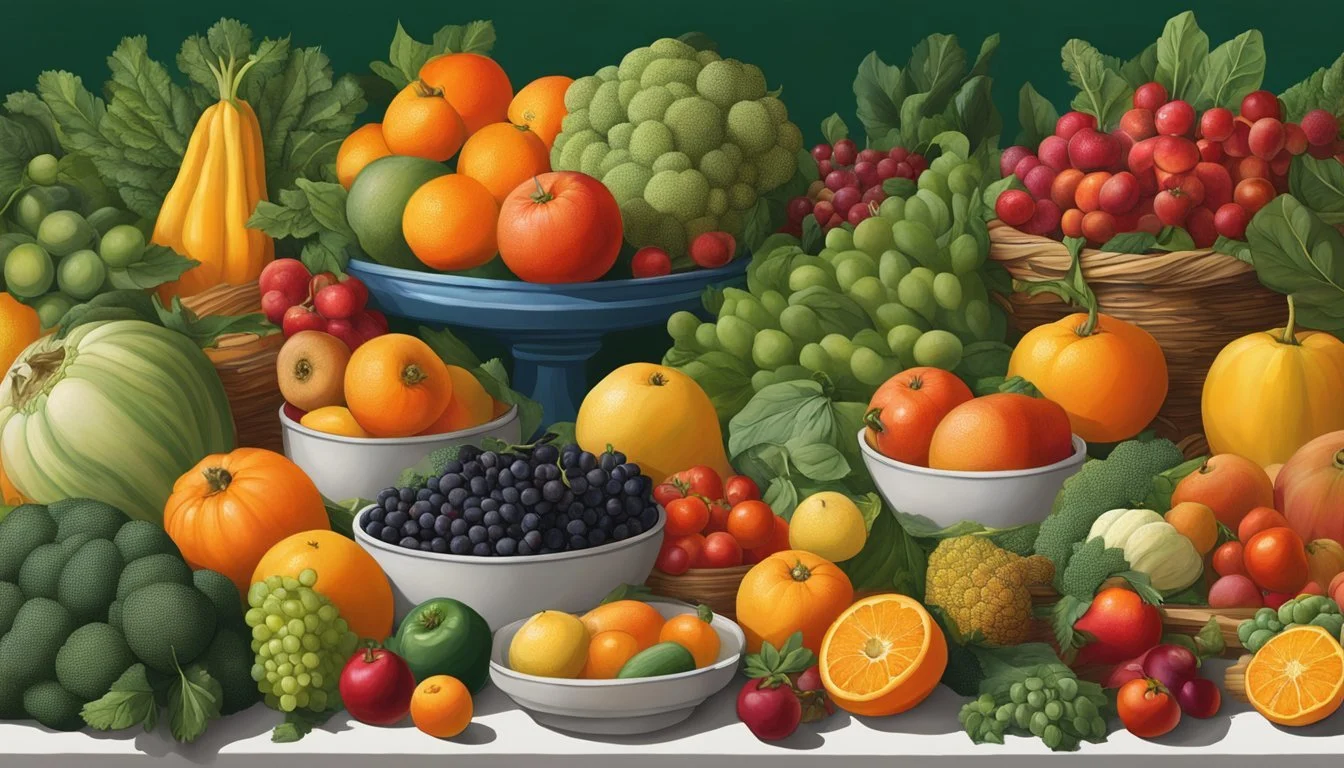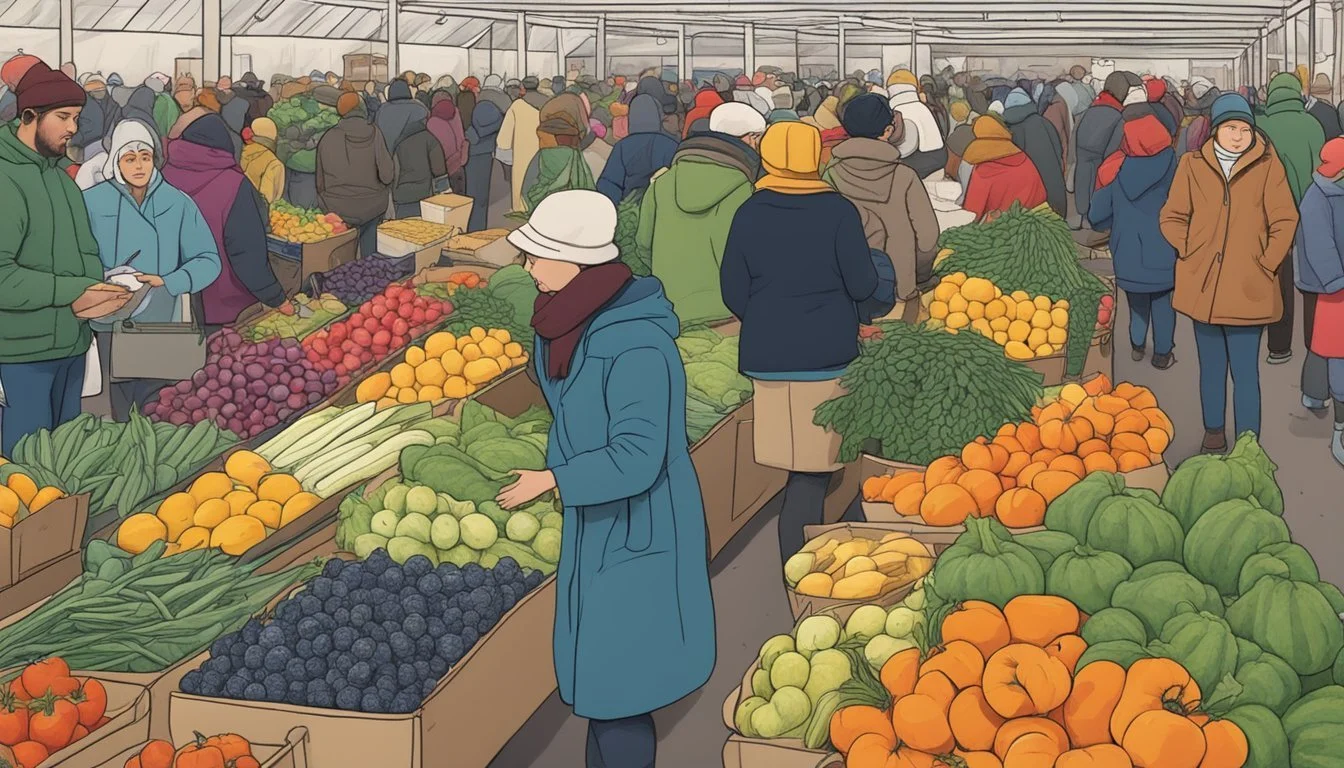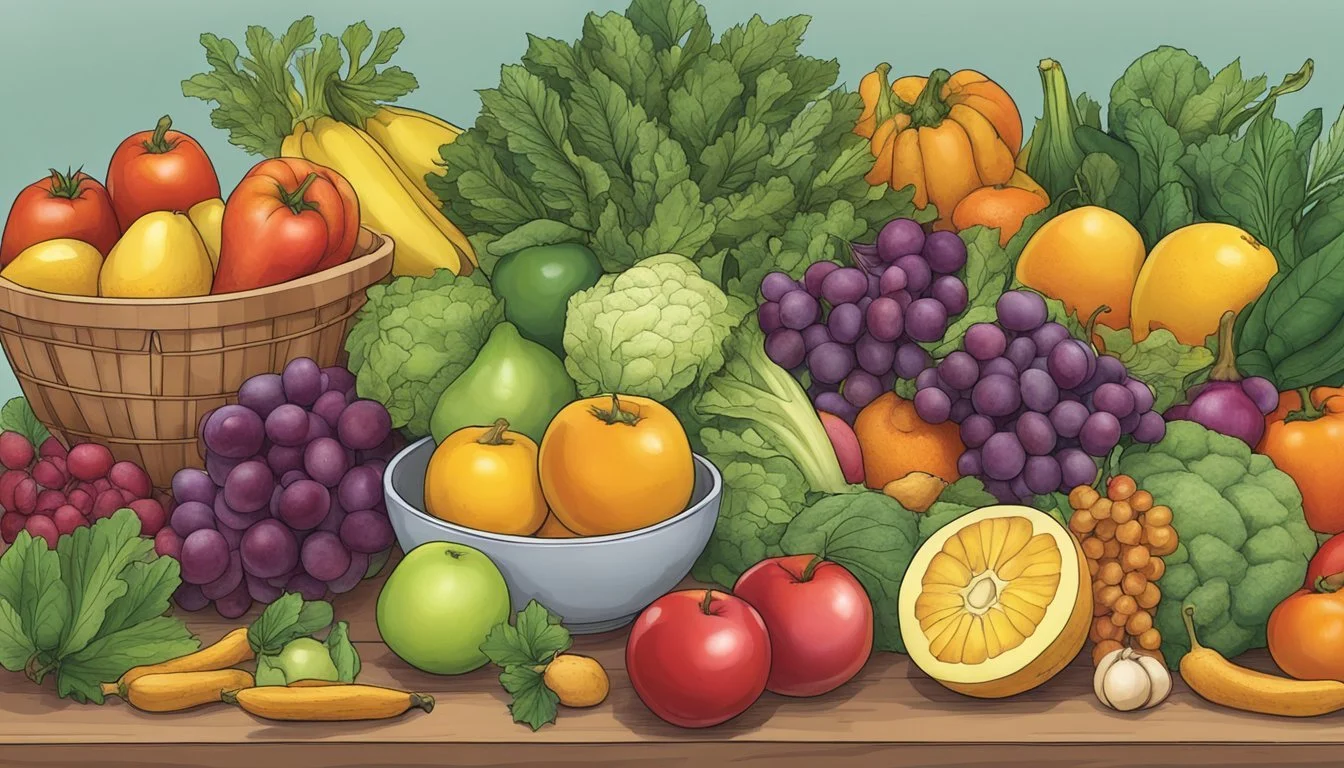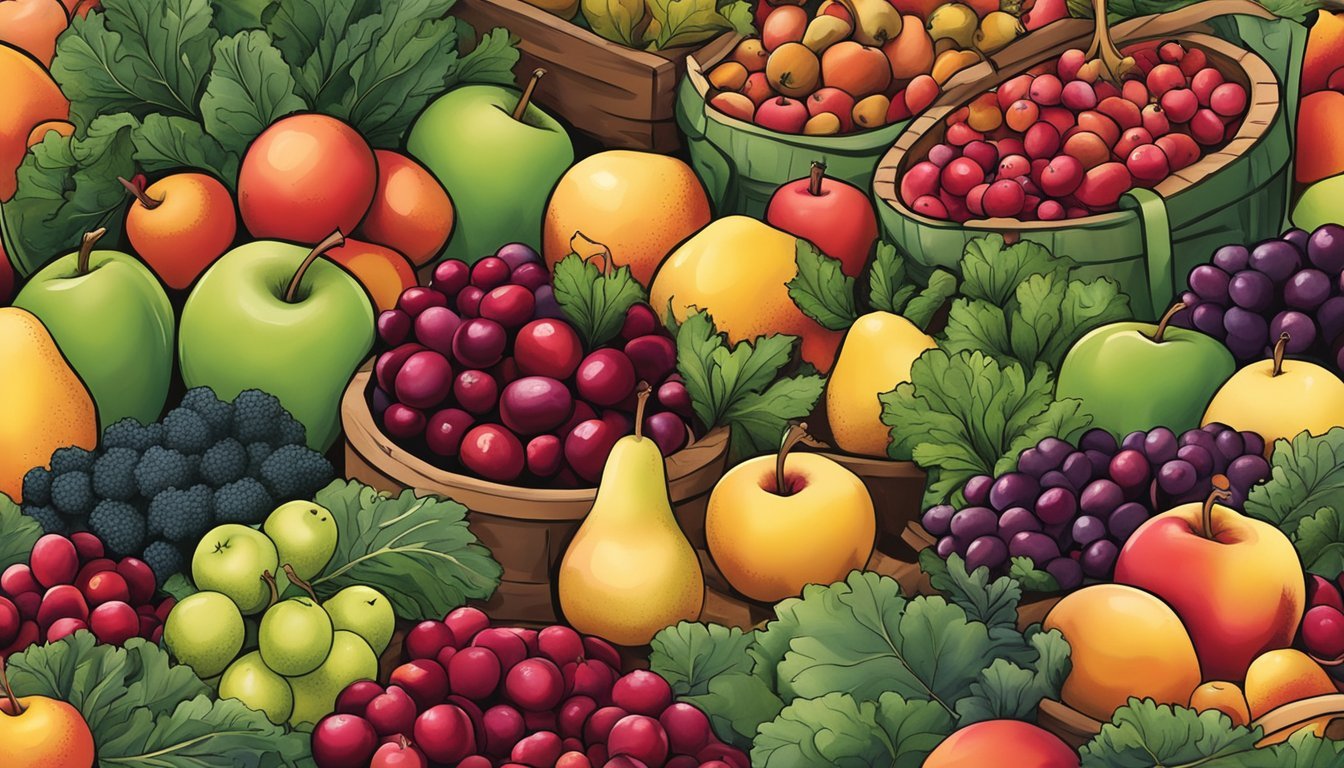New Jersey Seasonal Fruit & Vegetables in December
A Winter Produce Guide
This Article is Part of our New Jersey Seasonal Fruit & Veg Calendar
New Jersey's winter landscape, while often associated with barren fields and a lack of local produce, still offers a variety of fruits and vegetables that reach their peak in December. Committed to supporting a robust agricultural industry, the Garden State takes pride in the bounty that continues even during the colder months. Consumers have the opportunity to enjoy seasonal produce that is both fresh and flavorful, reflecting New Jersey's diverse agricultural offerings.
In December, the state's farms harvest a range of produce that thrives in the chill of winter. Cranberries, harvested from October through December, are one of New Jersey's most famous crops, often finding their way to holiday tables. Root vegetables also become available during this time, including a variety of squashes and hearty greens. The winter season does not hinder New Jersey's ability to provide fresh and nutritious options for those who prefer locally sourced fruits and vegetables.
Understanding Seasonality
When discussing the month of December in New Jersey, it is crucial to recognize the pivotal role of seasonality in agriculture. The produce available during this time is at its peak in terms of freshness and flavor.
Significance of Eating Seasonally
Eating seasonally involves selecting and consuming produce that is harvested at the time closest to consumption. They focus on the current month or calendar period within which food reaches its optimal state. In December, this brings to the forefront vegetables like kale (What wine goes well with kale?) and leeks, known for their resilience in colder temperatures. The practice of eating what is in season not only optimizes nutritional intake due to the freshness of the produce but also supports local farming communities by aligning with the natural growth cycle.
By choosing seasonal produce, consumers directly affect the demand for crops that are naturally ready for harvest. They reduce the environmental impact associated with transportation and storage of off-season items, underscoring a conscious choice for both health and sustainability.
Seasonal Conditions in New Jersey
December brings a distinct set of conditions that influence agriculture in New Jersey. The state's farmers must adapt to the colder temperatures and shorter days, which significantly impact what crops can be grown and harvested during this period.
Winter Agriculture in New Jersey
In December, New Jersey experiences its transition into the heart of winter. Farming activities during this time are limited due to the cold climate, as most traditional crops have finished their season. However, some hardy vegetables manage to thrive. Greenhouses and other controlled environments become crucial for extending growing seasons and protecting crops from frost.
The Impact of Climate
The winter climate of New Jersey consists of freezing temperatures and potential snowfall, making most outdoor agriculture challenging. However, New Jersey's farmers use innovative techniques like mulching and row covering to preserve soil warmth and protect plants. Additionally, the state's proximity to the Atlantic Ocean can moderate temperatures in coastal areas.
New Jersey's Farming Calendar
New Jersey's farming calendar adjusts for winter conditions. In December, the state's agricultural output shifts focus largely to cold storage crops and those that can be managed in protective structures. A brief overview of available produce during this month includes:
Vegetables: Cabbages, leeks, and brussels sprouts
Fruits: Limited, often reliant on storage from earlier seasons (e.g., apples)
Farmers also prepare for the upcoming spring during this downtime by maintaining equipment and planning future crops.
December's Seasonal Produce
In December, New Jersey's harvest offers an abundance of crisp vegetables and sweet fruits, making it an ideal time for winter recipes filled with fresh, local ingredients.
Vegetables Available in December
December showcases a variety of root vegetables and hearty winter greens. The selections include:
Root Vegetables: These staples store well through the cold months, providing sweet and earthy flavors.
Beets
Carrots
Turnips
Winter Squash: A versatile choice in the kitchen, winter squash is perfect for both savory dishes and desserts.
Butternut Squash (how long does butternut squash last?)
Acorn Squash
Greens: Full of nutrients, these leafy vegetables can be enjoyed cooked or raw in salads.
Spinach
Fruits to Enjoy in December
The fruit selection, while more limited, includes these sweet and citrus options:
Apples: Local varieties continue to be available from autumn's harvest.
Envy™ Apple
Citrus Fruits: Imported from warmer climates, citrus provides a refreshing contrast to the richer flavors of winter.
Oranges
Tangerines
These fruits and vegetables represent only a portion of New Jersey's local produce for December, reflecting the region's robust agricultural capabilities even during the cooler months.
Featured Fruits and Vegetables
In December, New Jersey offers a bounty of seasonal produce, with citrus fruits providing a refreshing burst of flavor, while root vegetables and hearty greens offer robust options for cold-weather dining.
Citrus Fruits
New Jerseyans enjoy a selection of citrus fruits in December. The tangy and sweet oranges and clementines are abundant, providing a rich source of Vitamin C.
Root Vegetables and Squash
The soil yields a variety of nourishing root vegetables and versatile squash this time of year. Shoppers can find turnips with their crisp, pungent flavor ready for roasting or stewing. A range of squash is available, with options like acorn and butternut squash that add a sweet, nutty flavor to dishes.
Hearty Green Vegetables
Robust green vegetables thrive in the colder months. Locals can savor kale and spinach, both packed with nutrients and ideal for warm salads and soups. Cabbage is also in season, perfect for hearty, comfort food recipes.
Buying Seasonal Produce
When purchasing seasonal produce in December, consumers should focus on items that are fresh, high in nutrients, and sourced directly from local markets and farms. These venues typically offer the freshest fruits and vegetables, often rich in antioxidants and vitamins, due to a shorter transport time from farm to consumer.
Local Markets and Farms
Local farmers' markets in New Jersey are a treasure trove for December produce that's just been picked, ensuring maximum freshness and nutrient quality. Shoppers can expect to find a variety of farm-fresh produce that not only supports local agriculture but also delivers exceptional taste and quality. Here's a snapshot of what's typically available:
Fruits: Look for items like cranberries, which are not only fresh and local but also high in antioxidants.
Vegetables: Root vegetables such as parsnips are in season, offering a hearty, nutrient-dense option for winter meals.
When visiting these local establishments, it is advisable to arrive early for the best selection. Shoppers can engage with farmers to learn more about the produce, including tips for picking and storing to maintain freshness. Choosing to buy from a local farm or market directly impacts the local economy and provides the buyer with some of the freshest produce options available.
Preparing Seasonal Dishes
In this section, readers will learn how to make the most of New Jersey's seasonal produce by exploring winter recipes and gaining tips for healthy eating. The emphasis is on utilizing December's bounty such as root vegetables and winter squash to create nourishing dishes.
Winter Recipes
Casseroles (What wine goes well with casseroles?): For a hearty meal, one can prepare a winter vegetable casserole blending sweet potatoes (What wine goes well with sweet potatoes?), parsnips, and rutabagas. Dice the vegetables, mix with herbs like thyme or rosemary, and bake until tender.
Roasted Vegetables: Roasting caramelizes the natural sugars in seasonal produce. Toss beets, carrots, and butternut squash with olive oil, season with salt and pepper, and roast to enhance their flavors.
Soups: A nutritious soup can be made by simmering chopped seasonal vegetables such as turnips and sweet potatoes in a vegetable or chicken broth. Add herbs for extra flavor and blend for a smooth consistency.
Salads: Fresh, seasonal salads can be created by pairing raw or roasted root vegetables with greens. Add a simple vinaigrette and toppings like nuts or goat cheese for texture and richness.
Healthy Eating Tips
Incorporating Seasonal Produce: Including a variety of seasonal vegetables in one's diet can provide essential vitamins and antioxidants. For example, a salad with roasted beets and orange segments offers vitamin C and iron.
Balancing Meals: The key to a healthy diet is balance. When preparing dishes, aim for a good mix of protein, fibers, and healthy fats. Add lean meats or legumes to vegetable soups and casseroles to achieve this balance.
By focusing on these tips and recipes, one can enjoy delicious and nutritious meals that fully embrace New Jersey's seasonal offerings.
Preserving and Storing
In New Jersey, December invites a shift in approach to fruit and vegetable consumption, focusing on preservation and storage to extend the shelf-life of seasonal produce.
Extend the Freshness
New Jersey seasonal produce benefits significantly from proper storage methods to maintain freshness. For instance:
Root vegetables like rutabagas and carrots thrive in cool, humid environments and can be kept in a root cellar or a similar cool storage area.
Leafy greens such as kale should be stored in the refrigerator, wrapped loosely in a damp cloth or a ventilated plastic bag to keep them crisp.
Freezing and Canning Techniques
Freezing: Freezing is a versatile method applicable to a wide range of fruits and vegetables.
Broccoli rabe and kale: Blanch before freezing to preserve color, flavor, and nutritional value.
Fruits: Package them in airtight containers or freezer bags to prevent freezer burn.
Canning: This process involves placing fruits and vegetables in jars and sealing them to prevent spoilage.
Tomatoes: Can be canned as sauces, juices, or whole, to capture their flavor at peak ripeness.
Pickles: Cucumbers can be transformed into pickles through vinegar or fermentation-based canning methods.
Conclusion
In the heart of winter, New Jersey's agricultural offerings may seem limited, yet they still provide a variety of fresh, locally-grown options. Root vegetables and robust leafy greens typically endure the cold months, offering nutrients and flavors that complement the season. Produce such as potatoes, broccoli, cauliflower, Brussels sprouts, and carrots are often available and perfect for warming dishes.
Farmers utilize methods like hoop houses to extend the growing season, ensuring that markets can provide fresh produce later into the year. These vegetables, along with squash and sweet potatoes, can be found in farmers' markets or local stores. They are excellent for roasting, stuffing, and incorporating into hearty meals like soups and casseroles.
The availability of such produce supports a year-round local food scene in New Jersey and encourages seasonal eating. It is remarkable that despite the chill of December, consumers can enjoy a selection of fresh, locally-sourced fruits and vegetables to help maintain a balanced diet.
One should stay informed about crop availability as it can vary year to year. Consumers are encouraged to connect with local farmers markets and utilize resources like seasonal guides to inform their shopping and meal planning. Supporting local agriculture during these colder months not only benefits the local economy but also ensures access to nutritious, fresh food.



